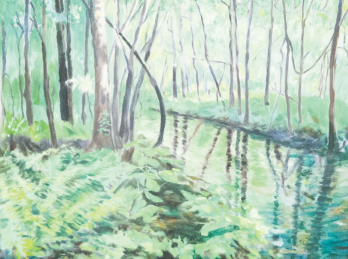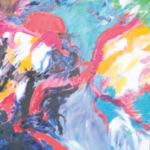
Florida Woods, Gator Country (oil) by Ralph C. Williams Jr.
Civil unrest in response to racism is a call for realignment of priorities in all aspects of society, including medical education. Hospital preparedness demands training in the treatment of victims of pepper spray, tear gas and rubber bullets, as well as planning for lockdown procedures in healthcare facilities and medical schools. Beyond logistics though, events like the 2015 death of Freddie Gray in police custody in Baltimore led to calls for renewed emphasis on addressing racism in medical training programs. Indeed, curricular reform to illuminate and begin to redress the complicity of medical education in societal injustices that are barriers to equitable care is of paramount importance for victims of social and economic disadvantage, as well as society at large.
Globally, such calls for medical education reform are exemplified by student-led campaigns in South Africa to diversify medical curricula by increasing incorporation of traditional African indigenous knowledge. These campaigns have resulted in the initiation of dialogues between faculty, students and traditional health practitioners regarding decolonization of the curriculum.
Based on the premise that colonization distanced medical providers from their own heritage of traditional values, beliefs and practices, one group of nursing students and faculty reached several conclusions. These scholars suggested that widespread adoption of a monolithic Western training approach in a culturally diverse society, such as South Africa, impedes the ability to deliver holistic, nondiscriminatory healthcare. They noted that reversing the effects of the eradication of African philosophy and traditional healing techniques from the medical curriculum would take intentional action in an environment of respect and advocacy on the part of institutions.
Confronting the tension between a monolithic mindset of traditional medical education and a more culturally relevant curriculum requires that educators recognize that utilization of the scientific method results in only one way of knowing. A systemic failure to call out both overt and implicit bias further insulates the ivory tower of medical schools and medical educators from community input and access.
Embracing pluralistic thinking is one path to dismantling bias. Inviting and encouraging societal input into medical education can help accomplish this.
Adopting an expanded perspective on who can participate in curricular development and how they can do so could redefine authoritative medical meaning-making and who confers authoritativeness on academia. In short, we believe it is possible, and preferable, to move away from didactic orthodoxy in education to a collaborative, community-learning model. This is in keeping with the 1995 WHO declaration that medical education address the priorities of the communities they serve.
Social responsiveness in the arena of medical education—in this case, through enhanced community participation—is a mechanism by which training programs can better emphasize fairness and achieve health equity and enhance transparency about where the power to make curricular change rests.


